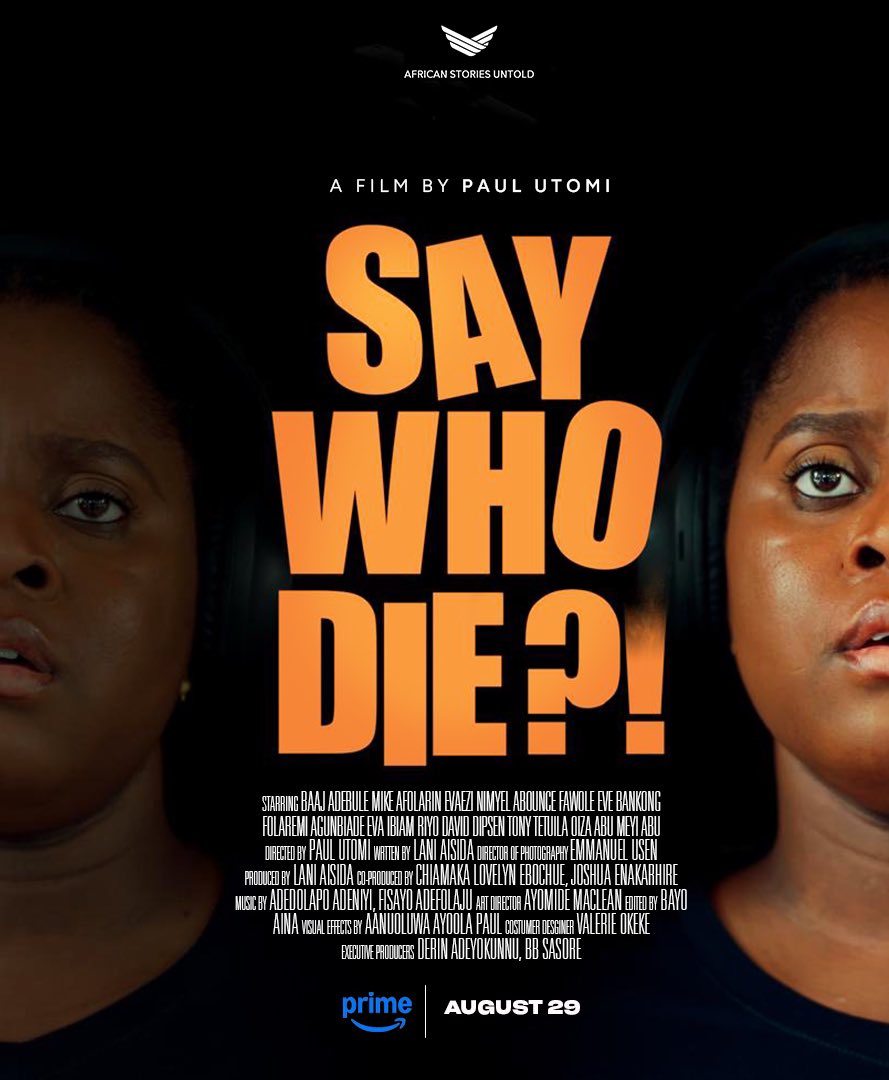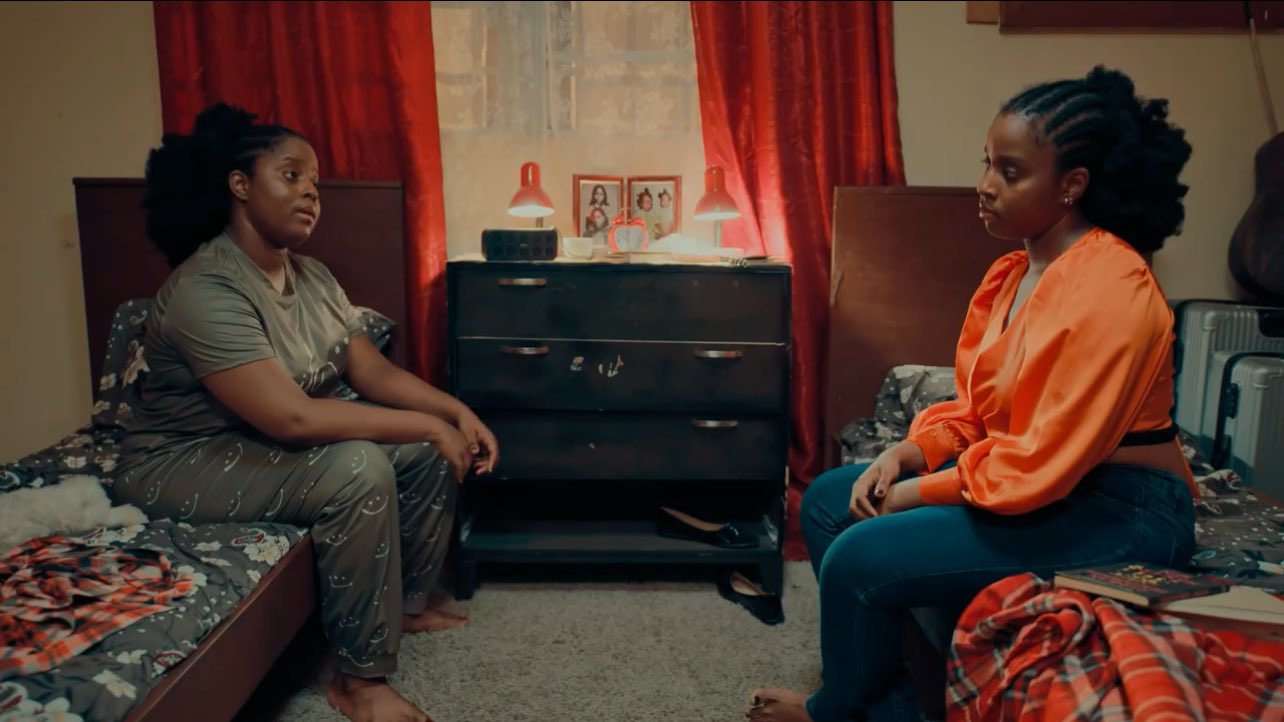Style without story is a hollow exercise, and Say Who Die? ultimately exposes Nollywood’s recurring struggle with experimentation.
By Joseph Jonathan
Say Who Die? arrived on Prime Video with the promise of daring experimentation: a dark comedy that blends family betrayal, drug underworld antics, and sibling rivalry into a three-day spiral of chaos. Directed by Paul Utomi and written by Lani Aisida, the film is led by twins Oiza and Meyi Abu in their feature debut.
On paper, it sounds like the sort of risk Nollywood should be taking more often: original, unafraid to mix tones, eager to present fresh faces. But in execution, it becomes a case study in how ambition, when not disciplined by craft, quickly curdles into incoherence.
The story introduces us to twin sisters: Odion (Oiza Abu), the erratic and chaotic sibling, and Omon (Meyi Abu), the perfect one who earns a scholarship to study abroad. Their father Innocent (Abounce Fawole) hides a secret affair with Rolake (Eva Bankong), while their mother Martha (Evaezi Nwimley) festers under the disillusionment of family life.
Odion gets entangled with Jaja (Baaj Adebule), a street hustler, while Omon inexplicably finds herself tied up with Abdul (Mike Afolarin), a drug peddler. When debts, betrayals, and drugs collide, tragedy is inevitable, and in this case, it takes the form of Omon’s death, a loss the film strains to make us mourn, but whose impact is blunted by sloppy execution.

At the centre of this failure is the storytelling. Say Who Die? mistakes chaos for complexity. Omon’s involvement in drug trafficking appears abruptly, without the narrative scaffolding needed to make it believable. This is the character consistently painted as the golden goose of the family — the one with promise, the one meant to rise above the dysfunction of her twin. For her to suddenly appear enmeshed in a drug ring, with no sense of mounting desperation or even coerced vulnerability, feels less like a natural progression and more like a writer’s shortcut.
Jaja’s release from prison is even more baffling. Accused of murder, he regains freedom simply because Odion tells the police he didn’t commit the crime. A moment that should carry the weight of justice, corruption, or even manipulation is reduced to a casual exchange, stripping the film of any credibility. It is not only implausible but dramatically empty, as though the filmmakers cared less about process and consequence than about shuffling characters into position for the next scene.
The poisoning subplot is another glaring example: Martha poisons a full bottle of drink at a party, leaves it lying around, and the plot expects us to accept this as anything other than a contrivance. Instead of suspense, the scene generates incredulity: how are we to fear for characters’ lives when the mechanics of their endangerment feel so sloppily staged? What should have been a tense and revealing moment becomes a parody of itself.
What remains most striking is the utter lack of emotional impact. Characters die, secrets unravel, betrayals are exposed — yet none of it matters because the film has given us no reason to care. When Omon is killed off, the moment is devoid of weight. There is no pity, no shock, not even anger.
Innocent’s discovery that his wife, Martha, might be responsible for their daughter’s death and his lover’s poisoning is treated with the emotional gravity of a casual shrug. A revelation that should rupture the family dynamic — exposing grief, rage, or at the very least denial — is instead brushed off with startling indifference.

The film’s biggest problem is that it confuses movement for momentum. Characters run, shout, fight, and make choices that appear urgent in the moment, but rarely build into anything that holds together. Odion, the supposed black sheep of the family, stumbles into the drug trade with astonishing ease, yet the danger of that world never materialises beyond the surface. Abdul, the drug dealer, is a less menacing kingpin than a neighbourhood nuisance, his presence undercut by a performance that feels both flat and oddly comic. The sense of threat is so thin that when conflicts are “resolved”, often through convenience rather than consequence, the story collapses into parody.
There are flashes of promise. The Abu twins, though inconsistent, show presence and energy that could mature under stronger direction. Oiza Abu gives Odion a fiery, restless energy, but her performance often tips into shouting rather than layered expression. Meyi Abu as Omon fares slightly better; her natural restraint lends itself to the role of the “good twin”, though even she falters when the script pushes her into absurdity, like the drug subplot that comes out of nowhere.
Baaj Adebule as Jaja is a particular sore spot. His acting is so mismatched in tone, so offbeat in choices, that it borders on parody. His most convincing moment is when he is entirely silent, walking in slow motion out of prison — a scene that works only because he is finally not speaking.
The editing, with its playful transitions, hints at what the film wanted to be: a kinetic, stylish ride through moral decay. But style without story is a hollow exercise, and Say Who Die? ultimately exposes Nollywood’s recurring struggle with experimentation. To be ambitious is not enough; the question is whether the ambition is shaped into coherence, whether the risks amount to revelation or merely noise. Emmanuel Usen’s cinematography occasionally catches the intimacy of family spaces, but more often than not, camera movements are distracting. The endless pans feel less like stylistic choices than nervous tics.
The sound design is perhaps the film’s most unforgivable technical flaw. For the most part, dialogue is out of sync with lip movements, the result of poorly handled ADR — the post-production process where actors re-record their lines to replace or fix location audio.

Voices surface without characters speaking, and the problem becomes so persistent that disbelief quickly turns to resignation. This is not a minor glitch but a glaring flaw that drags the film into amateur territory. Paired with a distracting score and uneven dialogue mixing, the film feels less like a professional release on Prime Video and more like an unfinished student project.
It is tempting to commend its ambition, to praise the debut of the Abu twins or the attempt at genre-blending. But even ambition requires discipline, and here it collapses under the weight of its own pretence. Say Who Die? does not simply stumble; it crashes, loudly and messily, into every pitfall of storytelling, acting, and technical execution.
There are poorly made films that you forget as soon as the credits roll, and then there are the ones that haunt you, not for their brilliance but for their audacity. Say Who Die? belongs squarely in the latter category. It arrived with the confidence of a work that knows what it wants to be. Yet, the longer you sit with it, the more you realise it is less a dark comedy than a collection of half-baked ideas stitched together with misplaced swagger.
Rating: 1.7/5
Joseph Jonathan is a historian who seeks to understand how film shapes our cultural identity as a people. He believes that history is more about the future than the past. When he’s not writing about film, you can catch him listening to music or discussing politics. He tweets @Chukwu2big.




